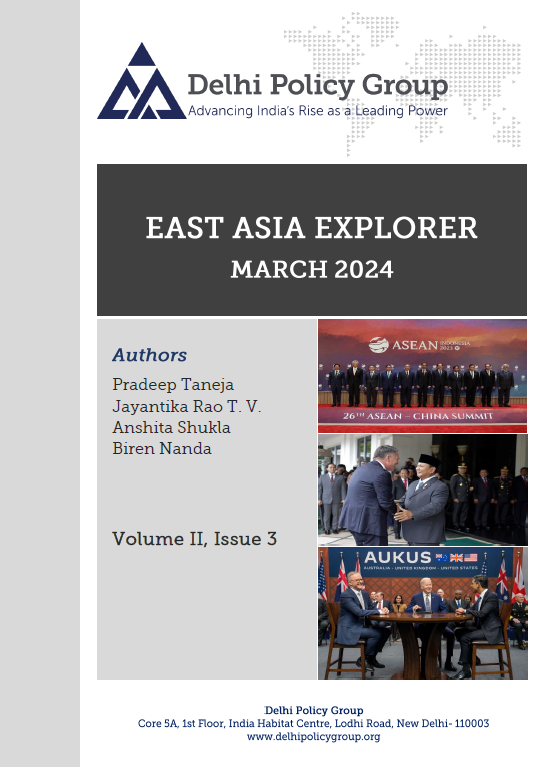East Asia Explorer
Date: March 29, 2024
The East Asia Explorer tracks evolving geopolitical trends, emerging security challenges, progress towards regional integration, and India’s relations with ASEAN and its member countries.
In this issue, Dr. Pradeep Taneja analyses the political crisis in Myanmar that started with the coup d’état in February 2021, which prevented the re-elected National League for Democracy (NLD) government, led by Aung San Suu Kyi, from taking power. He notes that instability in the country has created one of the worst humanitarian crises in the world, while also raising questions about ASEAN's declining role in resolving regional security issues.
Jayantika Rao’s brief evaluates the likely effectiveness of the proposed defence agreement between Indonesia and Australia by examining the two countries' current relationship. She highlights the differences in ideologies and values between the two, particularly on the issue of great power rivalry, which can impact the potential efficacy of the defence agreement.
Anshita Shukla reviews bilateral relations between China and the Association of Southeast Asian Nations (ASEAN), going beyond ongoing disputes in the South China Sea to assess growing economic engagement, as well as traditional and non-traditional security partnership, between the regional grouping and Beijing. These broader trends underpin stable relations between ASEAN and China.
Finally, Amb. Biren Nanda evaluates ASEAN’s centrality in the Regional Security Architecture in East Asia. He reviews the efficacy of ASEAN-led dialogues like the ASEAN Regional Forum (ARF) and the ASEAN Defence Ministers’ Meeting (ADMM) in dealing with hard security challenges arising from tensions in the South China Sea. He also analyses the impact of Quad and AUKUS on ASEAN centrality in the emerging security architecture in the Indo-Pacific.
To read this East Asia Explorer, Vol. II, Issue 3, please see the PDF attached.
In this issue, Dr. Pradeep Taneja analyses the political crisis in Myanmar that started with the coup d’état in February 2021, which prevented the re-elected National League for Democracy (NLD) government, led by Aung San Suu Kyi, from taking power. He notes that instability in the country has created one of the worst humanitarian crises in the world, while also raising questions about ASEAN's declining role in resolving regional security issues.
Jayantika Rao’s brief evaluates the likely effectiveness of the proposed defence agreement between Indonesia and Australia by examining the two countries' current relationship. She highlights the differences in ideologies and values between the two, particularly on the issue of great power rivalry, which can impact the potential efficacy of the defence agreement.
Anshita Shukla reviews bilateral relations between China and the Association of Southeast Asian Nations (ASEAN), going beyond ongoing disputes in the South China Sea to assess growing economic engagement, as well as traditional and non-traditional security partnership, between the regional grouping and Beijing. These broader trends underpin stable relations between ASEAN and China.
Finally, Amb. Biren Nanda evaluates ASEAN’s centrality in the Regional Security Architecture in East Asia. He reviews the efficacy of ASEAN-led dialogues like the ASEAN Regional Forum (ARF) and the ASEAN Defence Ministers’ Meeting (ADMM) in dealing with hard security challenges arising from tensions in the South China Sea. He also analyses the impact of Quad and AUKUS on ASEAN centrality in the emerging security architecture in the Indo-Pacific.
To read this East Asia Explorer, Vol. II, Issue 3, please see the PDF attached.



